论语名句英译-十二句
《论语》十二名句英译版
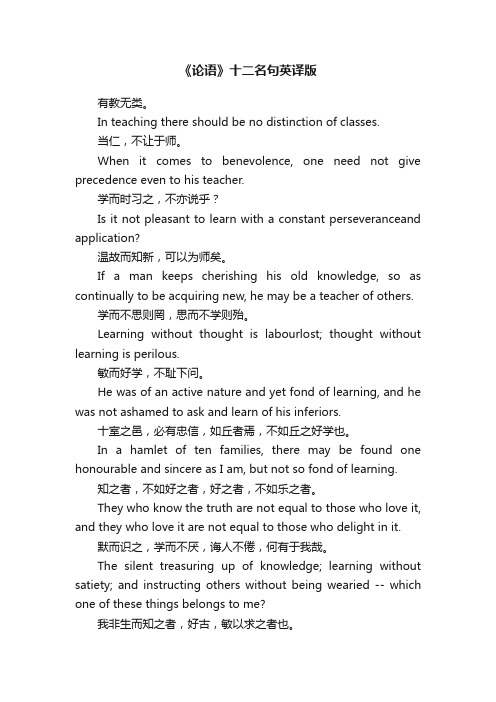
《论语》十二名句英译版有教无类。
In teaching there should be no distinction of classes.当仁,不让于师。
When it comes to benevolence, one need not give precedence even to his teacher.学而时习之,不亦说乎?Is it not pleasant to learn with a constant perseveranceand application?温故而知新,可以为师矣。
If a man keeps cherishing his old knowledge, so as continually to be acquiring new, he may be a teacher of others.学而不思则罔,思而不学则殆。
Learning without thought is labourlost; thought without learning is perilous.敏而好学,不耻下问。
He was of an active nature and yet fond of learning, and he was not ashamed to ask and learn of his inferiors.十室之邑,必有忠信,如丘者焉,不如丘之好学也。
In a hamlet of ten families, there may be found one honourable and sincere as I am, but not so fond of learning.知之者,不如好之者,好之者,不如乐之者。
They who know the truth are not equal to those who love it, and they who love it are not equal to those who delight in it.默而识之,学而不厌,诲人不倦,何有于我哉。
高中语文之《论语》十二章英文译文

高中语文之《论语》十二章英文译文1. 《子罕第四》子曰:“君子怀德,小人怀土。
君子怀刑,小人怀惠。
”English Translation:The Master said, "The noble-minded person cherishes virtue, while the petty-minded person cherishes material possessions. The noble-minded person cherishes justice, while the petty-minded person cherishes favors."2. 《子罕第七》子贡问曰:“先生云:'志于道,据于德,依于仁,游于艺。
'其中说者,其说何也?”子曰:“临川羡井,圣人之遗言也。
斯言之有康而无葆,大夫之斯言也。
”English Translation:Zigong asked, "Master, you said, 'Hold on to the Way, base yourself on Virtue, rely on Benevolence, and engage in the arts.' What does this mean?" The Master said, "These words were left behind by the sages from Linqiu and Xi'an. They contain wisdom but not self-promotion, which is the mark of a true aristocrat."3. 《子罕第二十三》子曰:“君子喻于义,小人喻于利。
”English Translation:The Master said, "A noble-minded person understands righteousness, while a petty-minded person understands personal gain."4. 《子罕第二十四》子曰:“君子从事于义,小人从事于利。
论语经典语录英语翻译(范文)
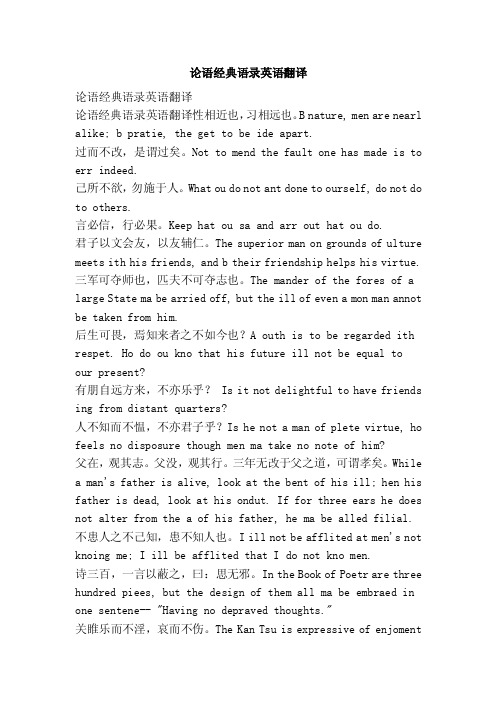
论语经典语录英语翻译论语经典语录英语翻译论语经典语录英语翻译性相近也,习相远也。
B natur e, men a re nearl alike;b pratie, the ge t to beide apar t.过而不改,是谓过矣。
Not to mend the fau lt one h as madeis to er r indeed.己所不欲,勿施于人。
What ou do n ot ant d one to o urself,do not d o to oth ers.言必信,行必果。
Kee p hat ou sa andarr outhat ou d o.君子以文会友,以友辅仁。
T he super ior manon groun ds of ul ture mee ts ith h is frien ds, andb theirfriendsh ip helps his vir tue. 三军可夺师也,匹夫不可夺志也。
Themander o f the fo res of a large S tate mabe arrie d off, b ut the i ll of ev en a mon man ann ot be ta ken from him.后生可畏,焉知来者之不如今也?A o uth is t o be reg arded it h respet. Ho doou kno t hat hisfuture i ll not b e equalto our p resent?有朋自远方来,不亦乐乎? Isit not d elightfu l to hav e friend s ing fr om dista nt quart ers?人不知而不愠,不亦君子乎?Is henot a ma n of ple te virtu e, ho fe els no d isposure thoughmen ma t ake no n ote of h im?父在,观其志。
论语精选一百句(中英文对照-英文摘自1914年哈佛版)

論語精選一百句論語學而篇第一一、子曰:「學而時習之,不亦說乎?有朋自遠方來,不亦樂乎?人不知而不慍,不亦君子乎?」THE MASTER said: “In learning and straightwaypractising is there not pleasure also? When friendsgather round from afar do we not rejoice? Whomlack of fame cannot vex is not he a gentleman?”二、子曰:「巧言令色,鮮矣仁。
」The Master said: “Honeyed words and flattering looks seldom speak of love.”三、子曰:「君子食無求飽,居無求安,敏於事而慎於言,就有道而正焉:可謂好學也已。
」The Master said:“A gentleman who is not a greedy eater, nor a lover of ease at home, who is earnest in deed and careful of speech, who seeks the righteous and profits by them,may be called fond of learning.”四、子曰:「不患人之不己知,患不知人也。
」The Master said: “Not to be known should not grieve you: grieve that ye know not men.”五、曾子曰:「吾日三省吾身:為人謀,而不忠乎?與朋友交,而不信乎?傳,不習乎?」Tseng-tzu said: “Thricedaily I ask myself: ‘Have I been unfaithful in dealing for others? Have I been untrue to friends? DoI practise what I preach?’”六、曾子曰:「慎終追遠,民德歸厚矣。
《论语》名句英文选译
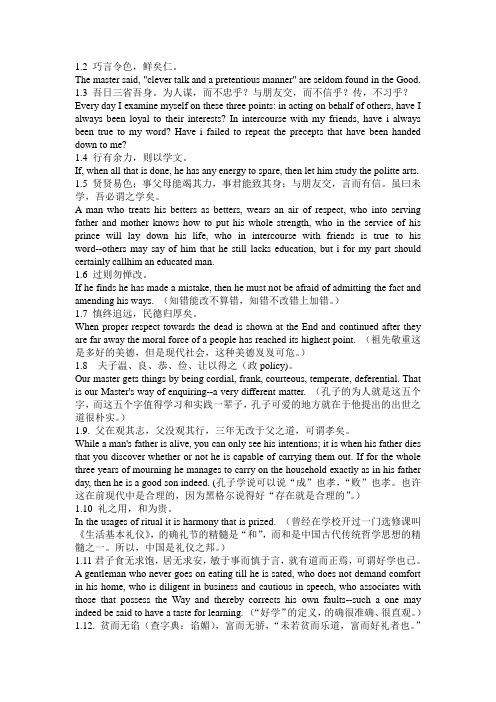
1.2 巧言令色,鲜矣仁。
The master said, "clever talk and a pretentious manner" are seldom found in the Good.1.3 吾日三省吾身。
为人谋,而不忠乎?与朋友交,而不信乎?传,不习乎?Every day I examine myself on these three points: in acting on behalf of others, have I always been loyal to their interests? In intercourse with my friends, have i always been true to my word? Have i failed to repeat the precepts that have been handed down to me?1.4 行有余力,则以学文。
If, when all that is done, he has any energy to spare, then let him study the politte arts.1.5 贤贤易色;事父母能竭其力,事君能致其身;与朋友交,言而有信。
虽曰未学,吾必谓之学矣。
A man who treats his betters as betters, wears an air of respect, who into serving father and mother knows how to put his whole strength, who in the service of his prince will lay down his life, who in intercourse with friends is true to his word--others may say of him that he still lacks education, but i for my part should certainly callhim an educated man.1.6 过则勿惮改。
《论语》名句英文选译

《论语》名句英文选译《论语》是中国古代文化宝库中的一颗明珠,里面汇集了孔子及其学生的言行和智慧。
这些名句展示了中国古代哲学的精髓,对于理解中国传统文化和人生智慧有着深远的影响。
以下是对《论语》中的一些名句的英文选译,希望能够帮助读者更好地理解和欣赏这些经典之作。
1. 学而时习之,不亦说乎。
Learning without thought is labor lost; thought without learning is perilous。
这句话强调了学习和思考的重要性,它们缺一不可,互相促进。
2. 巧言令色,鲜矣仁。
Fine words and an insinuating appearance are seldom associated with true virtue。
这句话告诫人们,虚伪的言辞和表面功夫很少与真正的美德相联系。
3. 知之者不如好之者,好之者不如乐之者。
Those who know are not as good as those who love, and those who love are not as good as those who enjoy。
这句话强调了对于知识的追求和热爱的重要性,只有真正享受其中的人才能达到更高的层次。
4. 不患人之不己知,患不知人也。
I will not be concerned at men's not knowing me; I will be concerned at my own want of ability。
这句话表达了对自身能力的不满足和追求,而不是关注他人是否了解自己。
5. 君子坦荡荡,小人长戚戚。
A gentleman is open and honest, while a petty person is always worried and suspicious。
这句话强调了君子的坦诚和小人的猜疑心态之间的区别。
孔子名言《论语》中的名言名句(英汉对照)

孔子名言《论语》中的名言名句(英汉对照)一、唯女子与小人,为难养也。
近之则不孙,远之则怨。
Of all people, girls and servants are the most difficultto behave to. If you are familiar with them, they lose their humility. If you maintain a reserve towards them, they are discontented.二、父母在,不远游,游必有方。
While his parents are alive, the son may not go abroad to a distance. If he does go abroad, he must have a fixed placeto which he goes.三、德不孤,必有邻。
Virtue is not left to stand alone. He who practices itwill have neighbors.四、吾十有五而志于学,三十而立,四十而不惑,五十而知天命,六十而耳顺,七十而从心所欲,不逾矩。
At fifteen I set my heart upon learning. At thirty, I planted my feet firm upon the ground. At forty, I no longer suffered from perplexities . At fifty, I knew what thebiddings of Heaven were. At sixty, I heard them with docile ear. At seventy, I could follow the dictates of my own heart; for what I desired no longer overstepped the boundaries of right.五、贤哉回也!一箪食,一瓢饮,在陋巷,人不堪其忧,回也不改其乐。
论语英文版语录

1、有朋⾃远⽅来,不亦乐乎? Is it not delightful to have friends coming from distant quarters?2、君⼦有三戒。
少之时,⾎⽓未定,戒之在⾊。
及其壮也,⾎⽓⽅刚,戒之在⽃。
及其⽼也,⾎⽓既衰,戒之在得。
There are three things which the superior man guards against. In youth, when the physical powers, are not yet settled, he guards against lust. When he is strong and the physical powers are full of vigor, he guards against quarrelsomeness. When he is old, and the animal powers are decayed, he guards against covetousness.3、知者乐⽔,仁者乐⼭。
知者动,仁者静。
知者乐,仁者寿。
The wise find pleasure in water; the virtuous find pleasure in hills. The wise are active; the virtuous are tranquil. The wise are joyful; the virtuous are long-lived.4、⾮礼勿视,⾮礼勿听,⾮礼勿⾔,⾮礼勿动。
Look not at what is contrary to propriety; listen not to what is contrary to propriety; speak not what is contrary to propriety; make no movement which is contrary to propriety.5、⽗母在,不远游,游必有⽅。
论语英文翻译
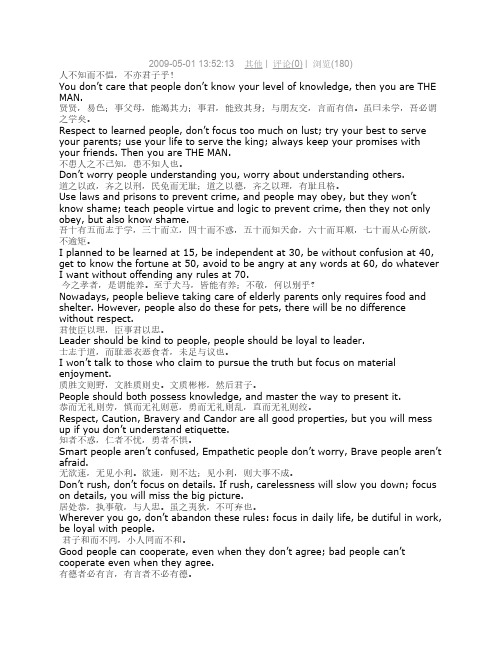
2009-05-01 13:52:13 其他 | 评论(0) | 浏览(180)人不知而不愠,不亦君子乎!You don’t care that people don’t know your level of knowledge, then you are THE MAN.贤贤,易色;事父母,能竭其力;事君,能致其身;与朋友交,言而有信。
虽曰未学,吾必谓之学矣。
Respect to learned people, don’t focus too much on lust; try your best to serve your parents; use your life to serve the king; always keep your promises with your friends. Then you are THE MAN.不患人之不己知,患不知人也。
Don’t worry people understanding you, worry about understanding others.道之以政,齐之以刑,民免而无耻;道之以德,齐之以理,有耻且格。
Use laws and prisons to prevent crime, and people may obey, but they won’t know shame; teach people virtue and logic to prevent crime, then they not only obey, but also know shame.吾十有五而志于学,三十而立,四十而不惑,五十而知天命,六十而耳顺,七十而从心所欲,不逾矩。
I planned to be learned at 15, be independent at 30, be without confusion at 40, get to know the fortune at 50, avoid to be angry at any words at 60, do whatever I want without offending any rules at 70.今之孝者,是谓能养。
孔子名言《论语》中的名言名句(英汉对照)
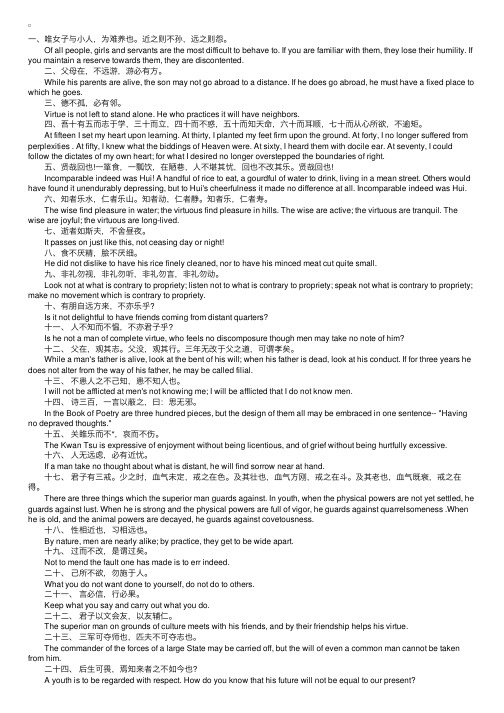
⼀、唯⼥⼦与⼩⼈,为难养也。
近之则不孙,远之则怨。
Of all people, girls and servants are the most difficult to behave to. If you are familiar with them, they lose their humility. If you maintain a reserve towards them, they are discontented. ⼆、⽗母在,不远游,游必有⽅。
While his parents are alive, the son may not go abroad to a distance. If he does go abroad, he must have a fixed place to which he goes. 三、德不孤,必有邻。
Virtue is not left to stand alone. He who practices it will have neighbors. 四、吾⼗有五⽽志于学,三⼗⽽⽴,四⼗⽽不惑,五⼗⽽知天命,六⼗⽽⽿顺,七⼗⽽从⼼所欲,不逾矩。
At fifteen I set my heart upon learning. At thirty, I planted my feet firm upon the ground. At forty, I no longer suffered from perplexities . At fifty, I knew what the biddings of Heaven were. At sixty, I heard them with docile ear. At seventy, I could follow the dictates of my own heart; for what I desired no longer overstepped the boundaries of right. 五、贤哉回也!⼀箪⾷,⼀瓢饮,在陋巷,⼈不堪其忧,回也不改其乐。
论语名句及翻译300句 英语
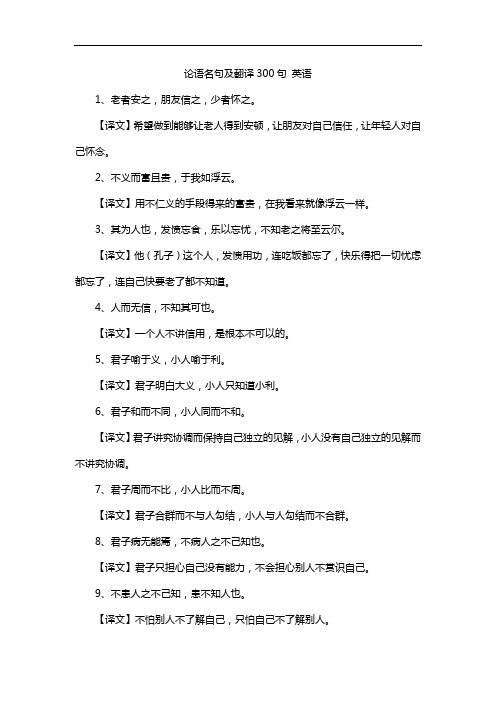
论语名句及翻译300句英语1、老者安之,朋友信之,少者怀之。
【译文】希望做到能够让老人得到安顿,让朋友对自己信任,让年轻人对自己怀念。
2、不义而富且贵,于我如浮云。
【译文】用不仁义的手段得来的富贵,在我看来就像浮云一样。
3、其为人也,发愤忘食,乐以忘忧,不知老之将至云尔。
【译文】他(孔子)这个人,发愤用功,连吃饭都忘了,快乐得把一切忧虑都忘了,连自己快要老了都不知道。
4、人而无信,不知其可也。
【译文】一个人不讲信用,是根本不可以的。
5、君子喻于义,小人喻于利。
【译文】君子明白大义,小人只知道小利。
6、君子和而不同,小人同而不和。
【译文】君子讲究协调而保持自己独立的见解,小人没有自己独立的见解而不讲究协调。
7、君子周而不比,小人比而不周。
【译文】君子合群而不与人勾结,小人与人勾结而不合群。
8、君子病无能焉,不病人之不己知也。
【译文】君子只担心自己没有能力,不会担心别人不赏识自己。
9、不患人之不己知,患不知人也。
【译文】不怕别人不了解自己,只怕自己不了解别人。
10、君子坦荡荡,小人长戚戚。
【译文】君子心地平坦宽广,小人时常烦恼忧愁。
11、岁寒,然后知松柏之后凋也。
【译文】到了最寒冷的冬天,这样以后才知道松树和柏树的叶子是最后凋谢的。
12、知之者不如好之者,好之者不如乐之者。
【译文】懂得它的人,不如爱好它的人;爱好它的人,又不如以它为乐的人。
13、知之为知之,不知为不知,是知也。
【译文】知道的就是知道,不知道就是不知道,这就是智慧啊!14、学而时习之,不亦说乎?有朋自远方来,不亦乐乎?人不知而不愠,不亦君子乎?【译文】学了能按时温习,不也是很快乐吗?有共同见解的人从远方来,不也是很快乐吗?不为他人所理解而不怨恨,不也是君子吗?15、温故而知新,可以为师矣。
【译文】温习学过的知识就可以得到新的体会,就可以当老师了。
16、学而不思则罔,思而不学则殆。
【译文】只读书却不思考,就会感到迷惑而无所得;只是空想却不认真学习,就会弄得精神疲倦而无所得17、敏而好学,不耻下问,是以谓之“文”也。
论语名句大全带翻译

论语名句大全带翻译The Complete Collection of Famous Quotes from the Analects with Translation。
The Analects, written by Confucius and his disciples,is one of the most influential books in Chinese history. It contains a collection of sayings and teachings that have had a profound impact on Chinese culture for over two thousand years. In this article, we will present a complete collection of famous quotes from the Analects with translation.1. 学而时习之,不亦说乎?Xué ér shí xí zhī, bù yì yuè hū?Isn't it a pleasure to study and practice what you have learned?2. 己所不欲,勿施于人。
Jǐ suǒ bù yù, wù shī yú rén.Do not do to others what you do not want done to yourself.3. 有朋自远方来,不亦乐乎?Yǒu péng zì yuǎn fāng lái, bù yì lè hū?Isn't it delightful to have friends coming from distant quarters?4. 工欲善其事,必先利其器。
论语名句及翻译

论语名句及翻译以下是论语中的部分名句及其翻译:1. 知之为知之,不知为不知,是知也。
(《论语·为政》)To know when you know and to know when you do not know, that is knowledge.2. 人而无信,不知其可也。
(《论语·学而》)A person without trustworthiness is hard to deal with.3. 君子爱财,取之有道。
(《论语·公冶长》)A gentleman loves wealth, but obtains it through ethical means.4. 学而时习之,不亦说乎?(《论语·学而》)Isn't it a pleasure to study and practice what you have learned?5. 己所不欲,勿施于人。
(《论语·颜渊》)What you do not wish for yourself, do not impose on others.6. 知者不惑,仁者不忧,勇者不惧。
(《论语·颜渊》)Those who are truly wise are not perplexed, those who are truly kind do not worry, and those who are truly brave are not afraid.7. 巧笑倩兮,美目盼兮。
(《论语·公冶长》)Her smiles are delicate, her eyes are enchanting.8. 人之过也,各于其党。
(《论语·卫灵公》)When a person makes a mistake, they can usually find others who have the same wrong mindset.9. 君子坦荡荡,小人长戚戚。
古代有句名言英文
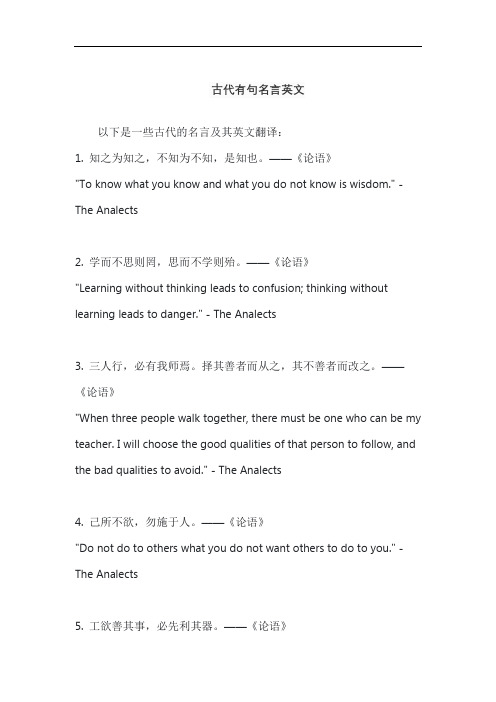
古代有句名言英文以下是一些古代的名言及其英文翻译:1. 知之为知之,不知为不知,是知也。
——《论语》"To know what you know and what you do not know is wisdom." - The Analects2. 学而不思则罔,思而不学则殆。
——《论语》"Learning without thinking leads to confusion; thinking without learning leads to danger." - The Analects3. 三人行,必有我师焉。
择其善者而从之,其不善者而改之。
——《论语》"When three people walk together, there must be one who can be my teacher. I will choose the good qualities of that person to follow, and the bad qualities to avoid." - The Analects4. 己所不欲,勿施于人。
——《论语》"Do not do to others what you do not want others to do to you." - The Analects5. 工欲善其事,必先利其器。
——《论语》"If a worker wants to do a good job, he must first sharpen his tools." - The Analects6. 天时不如地利,地利不如人和。
——《孟子》"Opportunities vouchsafed by Heaven are less important than terrestrial advantages, which in turn are less important than the unity among people." - Mencius7. 富贵不能淫,贫贱不能移,威武不能屈。
论语中英文对照英译
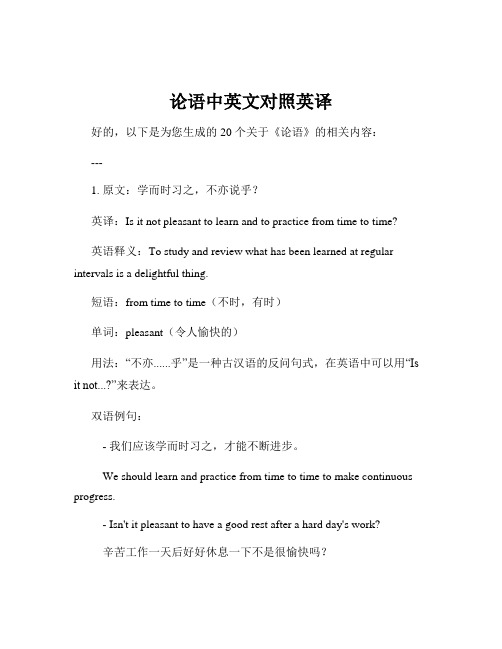
论语中英文对照英译好的,以下是为您生成的 20 个关于《论语》的相关内容:---1. 原文:学而时习之,不亦说乎?英译:Is it not pleasant to learn and to practice from time to time?英语释义:To study and review what has been learned at regular intervals is a delightful thing.短语:from time to time(不时,有时)单词:pleasant(令人愉快的)用法:“不亦......乎”是一种古汉语的反问句式,在英语中可以用“Is it not...?”来表达。
双语例句:- 我们应该学而时习之,才能不断进步。
We should learn and practice from time to time to make continuous progress.- Isn't it pleasant to have a good rest after a hard day's work?辛苦工作一天后好好休息一下不是很愉快吗?2. 原文:有朋自远方来,不亦乐乎?英译:Isn't it a delight when friends come from afar?英语释义:It is a great joy when friends come from a distance.短语:come from afar(来自远方)单词:delight(快乐,高兴)用法:“不亦乐乎”在英语中常用“Isn't it a delight...?”或“Isn't it a pleasure...?”来表达。
双语例句:- 今天有朋自远方来,我非常高兴。
Today, friends come from afar and I'm very happy.- The children were in a state of delight when they saw the presents.孩子们看到礼物时高兴极了。
论语十则英文翻译
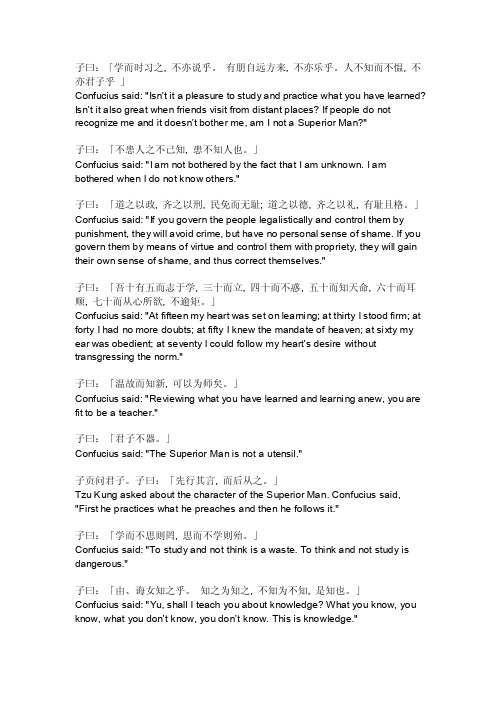
子曰:「学而时习之, 不亦说乎。
有朋自远方来, 不亦乐乎。
人不知而不愠, 不亦君子乎」Confucius said: "Isn’t it a pleasure to study and practice what you have learned? Isn’t it also great when friends visit from distant places? If people do not recognize me and it doesn’t bother me, am I not a Superior Man?"子曰:「不患人之不己知, 患不知人也。
」Confucius said: "I am not bothered by the fact that I am unknown. I am bothered when I do not know others."子曰:「道之以政, 齐之以刑, 民免而无耻; 道之以德, 齐之以礼, 有耻且格。
」Confucius said: "If you govern the people legalistically and control them by punishment, they will avoid crime, but have no personal sense of shame. If you govern them by means of virtue and control them with propriety, they will gain their own sense of shame, and thus correct themselves."子曰:「吾十有五而志于学, 三十而立, 四十而不惑, 五十而知天命, 六十而耳顺, 七十而从心所欲, 不逾矩。
」Confucius said: "At fifteen my heart was set on learning; at thirty I stood firm; at forty I had no more doubts; at fifty I knew the mandate of heaven; at sixty my ear was obedient; at seventy I could follow my heart’s desire without transgressing the norm."子曰:「温故而知新, 可以为师矣。
孔子语录(论语)中英文对照翻译
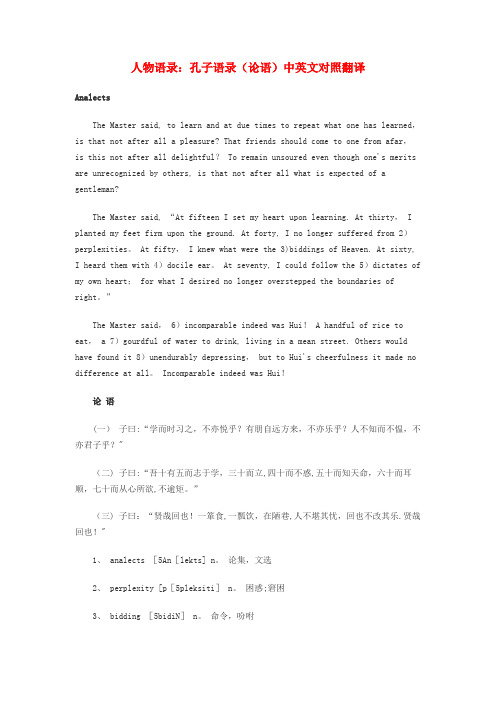
人物语录:孔子语录(论语)中英文对照翻译AnalectsThe Master said, to learn and at due times to repeat what one has learned,is that not after all a pleasure? That friends should come to one from afar,is this not after all delightful? To remain unsoured even though one's merits are unrecognized by others, is that not after all what is expected of a gentleman?The Master said, “At fifteen I set my heart upon learning. At thirty, I planted my feet firm upon the ground. At forty, I no longer suffered from 2)perplexities。
At fifty, I knew what were the 3)biddings of Heaven. At sixty, I heard them with 4)docile ear。
At seventy, I could follow the 5)dictates of my own heart; for what I desired no longer overstepped the boundaries of right。
”The Master said, 6)incomparable indeed was Hui! A handful of rice to eat, a 7)gourdful of water to drink, living in a mean street. Others would have found it 8)unendurably depressing, but to Hui's cheerfulness it made no difference at all。
论语中经典句子的英文名

论语中经典句子的英文名1. 学而时习之,不亦说乎?- Xue er shi xi zhi, bu yi yue hu? (Is it not delightful to have friends coming from distant quarters to learn with you?)2. 己所不欲,勿施于人。
- Ji suo bu yu, wu shi yu ren. (What you do not want done to yourself, do not do to others.)3. 不患人之不己知,患不知人也。
- Bu huan ren zhi bu ji zhi, huan bu zhi ren ye. (I will not be bothered by the fact that others do not recognize my abilities; my concern lies in not recognizing theirs.)4. 知之者不如好之者,好之者不如乐之者。
- Zhi zhi zhe bu ru hao zhi zhe, hao zhi zhe bu ru le zhi zhe. (To know is not as good as to love, to love is not as good as to enjoy.)5. 君子一言,驷马难追。
- Junzi yi yan, si ma nan zhui. (A gentleman's words are as precious as swiftly running horses; once they are spoken, they are challenging to take back.)6. 学而不思则罔,思而不学则殆。
- Xue er bu si ze wang, si er bu xue ze dai. (Learning without thinking leads to confusion, while thinking without learning is perilous.)7. 己所不欲,勿施于人。
论语经典名言英语
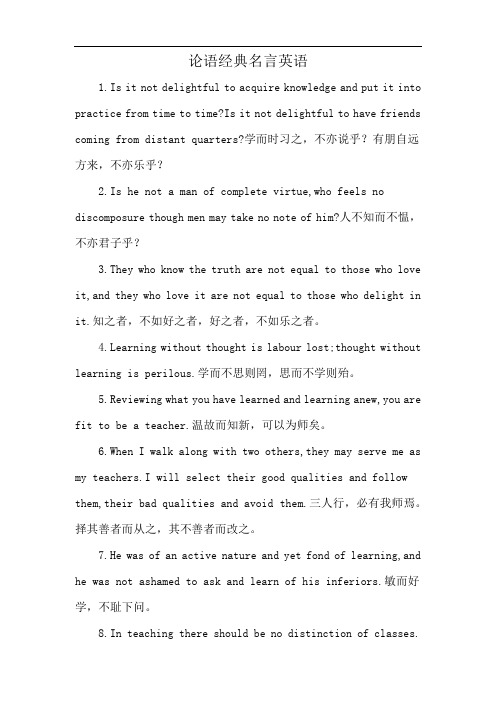
论语经典名言英语1.Is it not delightful to acquire knowledge and put it into practice from time to time?Is it not delightful to have friends coming from distant quarters?学而时习之,不亦说乎?有朋自远方来,不亦乐乎?2.Is he not a man of complete virtue,who feels no discomposure though men may take no note of him?人不知而不愠,不亦君子乎?3.They who know the truth are not equal to those who love it,and they who love it are not equal to those who delight in it.知之者,不如好之者,好之者,不如乐之者。
4.Learning without thought is labour lost;thought without learning is perilous.学而不思则罔,思而不学则殆。
5.Reviewing what you have learned and learning anew,you are fit to be a teacher.温故而知新,可以为师矣。
6.When I walk along with two others,they may serve me as my teachers.I will select their good qualities and follow them,their bad qualities and avoid them.三人行,必有我师焉。
择其善者而从之,其不善者而改之。
7.He was of an active nature and yet fond of learning,and he was not ashamed to ask and learn of his inferiors.敏而好学,不耻下问。
- 1、下载文档前请自行甄别文档内容的完整性,平台不提供额外的编辑、内容补充、找答案等附加服务。
- 2、"仅部分预览"的文档,不可在线预览部分如存在完整性等问题,可反馈申请退款(可完整预览的文档不适用该条件!)。
- 3、如文档侵犯您的权益,请联系客服反馈,我们会尽快为您处理(人工客服工作时间:9:00-18:30)。
学而不思则罔,思而不学则殆。
Learning without thought is labourlost; thought without learning is perilous.
敏而好学,不耻下问。
He was of an active nature and yet fond of learning, and he was not ashamed to ask and learn of his inferiors.
我非生而知e who was born in the possession of knowledge; I am one who is fond of antiquity, and earnest in seeking it there.
三人行,必有我师焉。择其善者而从之,其不善者而改之。
学如不及,犹恐失之。
Learn as if you could not reach your object, and were always fearing also lest you should lose it.
They who know the truth are not equal to those who love it, and they who love it are not equal to those who delight in it.
默而识之,学而不厌,诲人不倦,何有于我哉。
The silent treasuring up of knowledge; learning without satiety; and instructing others without being wearied -- which one of these things belongs to me?
When I walk along with two others, they may serve me as my teachers. I will select their good qualities and follow them, their bad qualities and avoid them.
十室之邑,必有忠信,如丘者焉,不如丘之好学也。
In a hamlet of ten families, there may be found one honourable and sincere as I am, but not so fond of learning.
知之者,不如好之者,好之者,不如乐之者。
学而时习之,不亦说乎?
Is it not pleasant to learn with a constant perseveranceand application?
温故而知新,可以为师矣。
If a man keeps cherishing his old knowledge, so as continually to be acquiring new, he may be a teacher of others.
有教无类。
In teaching there should be no distinction of classes.
当仁,不让于师。
When it comes to benevolence, one need not give precedence even to his teacher.
